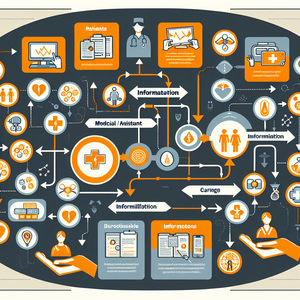The Intersection of Technology and Healthcare: How New York's Medical Device Companies Are Shaping the Future

One of the most promising applications of AI in the medical device arena is in diagnostics. Companies like Zebra Medical Vision, based in New York, are developing AI algorithms that analyze medical imaging data to identify diseases such as cancer and cardiovascular conditions with remarkable accuracy. Their technology not only speeds up the diagnostic process but also reduces the chances of human error, leading to earlier interventions and improved patient outcomes. According to a study published in the Journal of Medical Internet Research, AI-assisted diagnostics can enhance the accuracy of disease detection by up to 20%, showcasing the tangible benefits of integrating AI into healthcare. Other notable companies, such as Aidoc and Qure.ai, are also making strides in using AI for real-time imaging analysis, further solidifying New York's place as a leader in this space.
The Internet of Things (IoT) and Remote Patient Monitoring
The rise of IoT has led to the development of smart medical devices that can monitor patients remotely. Companies like HealthBeacon are pioneering solutions that allow patients to track their medication adherence through connected devices. These devices send reminders and alerts to both patients and caregivers, ensuring that medication is taken as prescribed. This innovative approach not only improves adherence but also provides healthcare providers with real-time data, enabling them to make informed decisions about patient care. A report by the Global Market Insights indicates that the IoT in healthcare market is projected to exceed $500 billion by 2025, emphasizing the growing significance of this technology. AliveCor, another New York-based company, has developed portable ECG devices that connect to smartphones, enabling patients to monitor their heart health remotely.
Telemedicine: Breaking Barriers in Healthcare Access
Telemedicine has gained immense popularity, especially in the wake of the COVID-19 pandemic, and New York companies are at the forefront of this transformation. Firms like Amwell and Doxy.me are working to integrate telemedicine solutions directly into their medical devices, allowing for seamless virtual consultations. This integration not only expands access to healthcare for patients in remote areas but also streamlines the process for those with mobility challenges. A survey by McKinsey revealed that telehealth utilization has stabilized at levels 38 times higher than before the pandemic, illustrating how technology has fundamentally changed the way patients access care. Moreover, companies like Talkspace are enhancing mental health services through teletherapy platforms, demonstrating the diverse applications of telehealth technologies.
Data Security and Ethical Considerations
While the integration of technology into medical devices presents significant advancements, it also raises concerns regarding data security and ethical considerations. With the increasing reliance on connected devices, the potential for data breaches has become a pressing issue. Companies are now prioritizing cybersecurity measures to protect sensitive patient information. In New York, Medidata Solutions is a leader in this regard, providing cloud-based solutions that ensure data integrity and compliance with regulatory standards. The emphasis on ethical data use and patient privacy is crucial as the healthcare landscape evolves. Additionally, Cureatr, a medication management platform, emphasizes secure and efficient communication between healthcare providers and patients, showcasing a commitment to data security.
Collaborative Innovation and Future Trends
The collaborative spirit of New York’s medical device sector fosters innovation. Universities, research institutions, and startups often team up to create groundbreaking technologies. For instance, partnerships between Columbia University and startups have led to the development of advanced prosthetics that integrate AI, providing users with more natural movement. Looking ahead, we can expect to see an increase in personalized medicine, where devices are tailored to meet the individual needs of patients, further enhancing treatment efficacy. Companies like Thermo Fisher Scientific and CureMetrix are also exploring the potential of machine learning and AI to personalize healthcare solutions effectively.
New York’s medical device companies are not just keeping pace with technological advancements; they are leading the way in shaping the future of healthcare. By leveraging AI, IoT, and telemedicine, these innovators are enhancing patient care, improving diagnostic accuracy, and breaking down barriers to access. As the industry continues to evolve, it is essential for stakeholders to address ethical and security challenges while fostering a collaborative environment that encourages innovation. The future of healthcare is bright, and with New York at the helm, it promises to be more efficient, accessible, and patient-centered than ever before. As these technologies continue to develop, we can anticipate a healthcare landscape that not only meets but exceeds the expectations of patients and providers alike.
AI Medical Imaging Specialist
Zebra Medical Vision, Aidoc, Qure.ai
Core Responsibilities
Develop and optimize AI algorithms for analyzing medical imaging data to assist in disease detection.
Collaborate with healthcare professionals to validate AI outputs and ensure clinical relevance.
Conduct research on new AI methodologies and implement models in real-world medical settings.
Required Skills
Proficiency in machine learning frameworks (e.g., TensorFlow, PyTorch) and programming languages (Python, R).
Strong understanding of medical imaging techniques and familiarity with imaging modalities (CT, MRI, etc.).
Experience in data analysis and statistical methods for evaluating model performance.
IoT Solutions Engineer for Healthcare
HealthBeacon, AliveCor
Core Responsibilities
Design and implement IoT devices that enable remote patient monitoring and medication adherence.
Work with cross-functional teams to integrate IoT solutions into existing healthcare infrastructures.
Analyze data collected from IoT devices to provide insights and improve patient care processes.
Required Skills
Strong background in embedded systems, networking, and cloud technologies.
Familiarity with healthcare regulations (e.g., HIPAA) and data security best practices.
Experience with programming languages like C/C++ and Python, and IoT platforms (e.g., AWS IoT).
Telehealth Product Manager
Amwell, Doxy.me, Talkspace
Core Responsibilities
Oversee the development and launch of telemedicine products that facilitate virtual consultations.
Gather and analyze user feedback to continuously improve product offerings and user experience.
Collaborate with regulatory teams to ensure compliance with telehealth regulations and standards.
Required Skills
Strong project management skills with experience in agile methodologies.
Knowledge of telehealth technologies and user interface design principles.
Excellent communication and stakeholder management abilities.
Cybersecurity Analyst in Healthcare
Medidata Solutions, Cureatr
Core Responsibilities
Monitor and protect sensitive patient data and medical device networks from cyber threats.
Conduct risk assessments and vulnerability testing to enhance security measures.
Develop and implement cybersecurity policies and training programs for healthcare staff.
Required Skills
Strong understanding of cybersecurity practices, including firewalls, intrusion detection systems, and encryption technologies.
Familiarity with healthcare compliance standards (e.g., HIPAA, GDPR) and data protection laws.
Experience in incident response and knowledge of security frameworks (e.g., NIST, ISO 27001).
Medical Device Regulatory Affairs Specialist
Thermo Fisher Scientific, CureMetrix
Core Responsibilities
Ensure compliance with regulatory requirements for the development and marketing of medical devices.
Prepare and submit documentation to regulatory bodies (e.g., FDA, EMA) for device approvals.
Monitor changes in regulations affecting the medical device sector and advise on necessary adaptations.
Required Skills
In-depth knowledge of regulatory guidelines and standards applicable to medical devices.
Strong analytical skills and attention to detail for documentation and submission processes.
Excellent communication skills for collaboration with cross-functional teams and external regulators.


